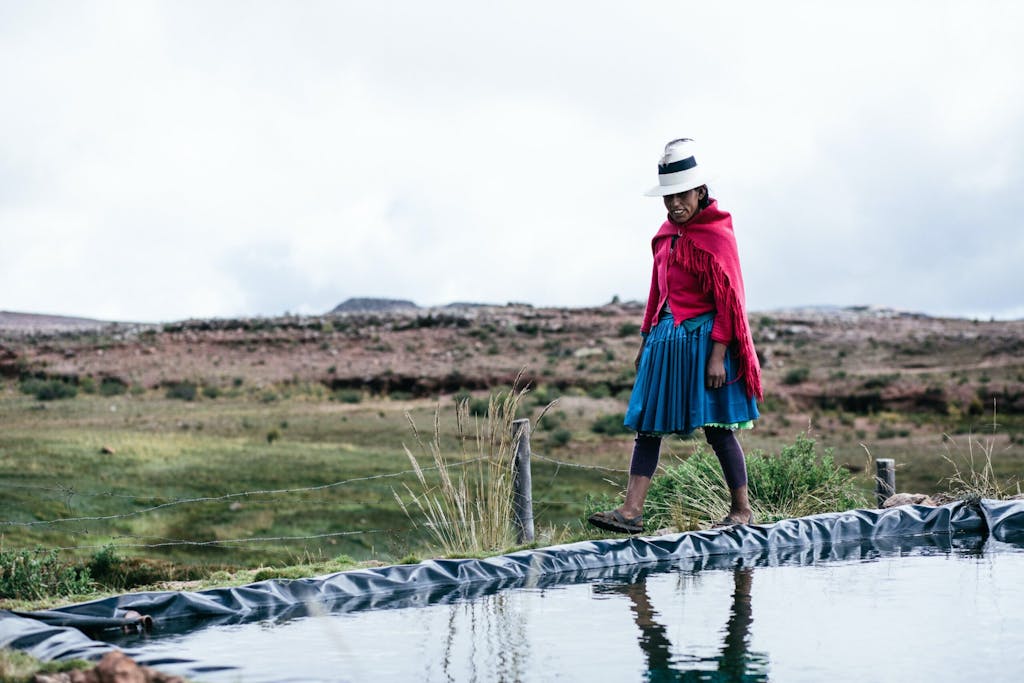This post is the fourth in a series on God’s Story, the Foundation for FH’s Work in Relief and Development. Follow the series, starting with the first post. You can read the next post in the series here.
Eleuterio and Maria were some of the first people in their Bolivian community to sign up to help with a clean water project. They had experienced the effects of dirty water over the years. Their four children–two boys and two girls–were constantly sick with diarrhea and malnourishment.
When the couple signed up to help their community to achieve their dream of accessible, clean water, they were expecting to dig trenches and lay pipe. They weren’t expecting to hear about God or faith. Quickly, they discovered that when Food for the Hungry (FH) partners with a community, we don’t just settle with the “what” of the project. We believe the “how” and the process of transformation is just as important.
What’s the Point of Asking “How?”
 When we are working toward transformational development, it’s easy to jump to getting the job done. Does the community lack clean water? The solution must be building a clean water well. Are their children malnourished? They must need community gardens and nutritional education.
When we are working toward transformational development, it’s easy to jump to getting the job done. Does the community lack clean water? The solution must be building a clean water well. Are their children malnourished? They must need community gardens and nutritional education.
The problem with asking “what” first is that the physical project is not the most important outcome. Even more critical than the physical well-being of people is the way they understand themselves, God’s creation, and God himself. Every project is a wonderful opportunity to convey biblical principles. For example, a clean water project allows the community to see that God made them in His image. He made them to be able to thrive in their environment, and He has given them everything they need–physically, socially, mentally and spiritually–to provide for their children.
What’s more, when we ask “how,” we are honing in on long-term change by changing someone’s worldview. If a man believes that women are equally valued by God and has dignity, they will think twice about beating her. Even a clean water well requires maintenance. It takes cooperation from neighbors. They must agree on where the well will be, who will take care of it, and who is responsible if it breaks. If the community members do not believe that God has good plans for them, and that He wants them to succeed, they may let the well become contaminated or leave it broken. They may have a fatalistic mindset, believing that a broken well is a sign that they are not meant to have clean water.
Jesus Ministered Through Wells, Too
We are in good company when we use opportunities like water wells to discuss the things of God. In John 4, Jesus met a Samaritan woman at a well and used the opportunity to change her life. “When a Samaritan woman came to draw water, Jesus said to her, ‘Will you give me a drink?’” (John 4:7, NIV)

Jesus discussed physical thirst with the woman, but he dove deeper too. He answered her questions with responses that intrigued her. He gently challenged the sin in her life. The result was that many Samaritans came to faith because of the woman’s testimony. “Many of the Samaritans from that town believed in him because of the woman’s testimony, ‘He told me everything I ever did'” she said (John 4:39, NIV).
Theologian Wilbert Shenk commented on this passage, “The ministry of Jesus is notable for its clarity of focus and flexibility of response. Jesus responds to people in that way. Jesus allowed people to set the agenda. But Jesus always responded out of who he was and what he represented. We know that Jesus both announced the Kingdom of God and embodied that reality, God’s new order.”
Clean Water–And More
Eleuterio and Maria have much to be thankful for. Today, their community has clean water piped all the way to each home. Their children no longer walk long distances to fetch water. They are healthy and attending school. The family is even growing their own vegetables to supplement their diets with vitamins and minerals.
 However, when asked what they are thankful for, their first thought is not the physical changes in their lives. Maria said, “We are grateful to have been taught biblical truths through training. We learned so much from FH staff, who always spoke to us about biblical principles and values.” She adds, “We are also grateful for the projects that have been implemented in our community, such as the construction and expansion of water and sanitation units that benefit our children.”
However, when asked what they are thankful for, their first thought is not the physical changes in their lives. Maria said, “We are grateful to have been taught biblical truths through training. We learned so much from FH staff, who always spoke to us about biblical principles and values.” She adds, “We are also grateful for the projects that have been implemented in our community, such as the construction and expansion of water and sanitation units that benefit our children.”
FH calls this approach “Transformational Relief and Development.” You can learn more about our work here. It is community development that focuses not only on the physical outcome, but also on the “how” of every project.
Who are you serving in your own community? Have you thought about how your acts of service are communicating a deeper message? Next time you help someone, think about what you are showing them about who God is, and who God says they are.
Follow the other articles in the God’s Story series:
God’s Story: The Story That Matters Most



